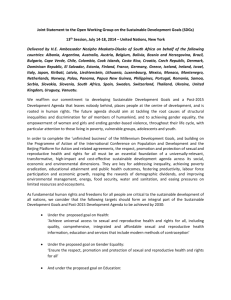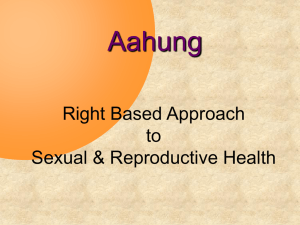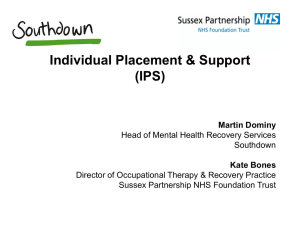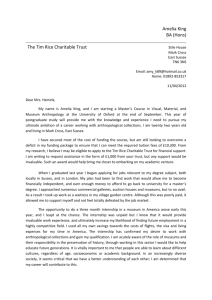Global Flows, Human Rights, Sexual and
advertisement
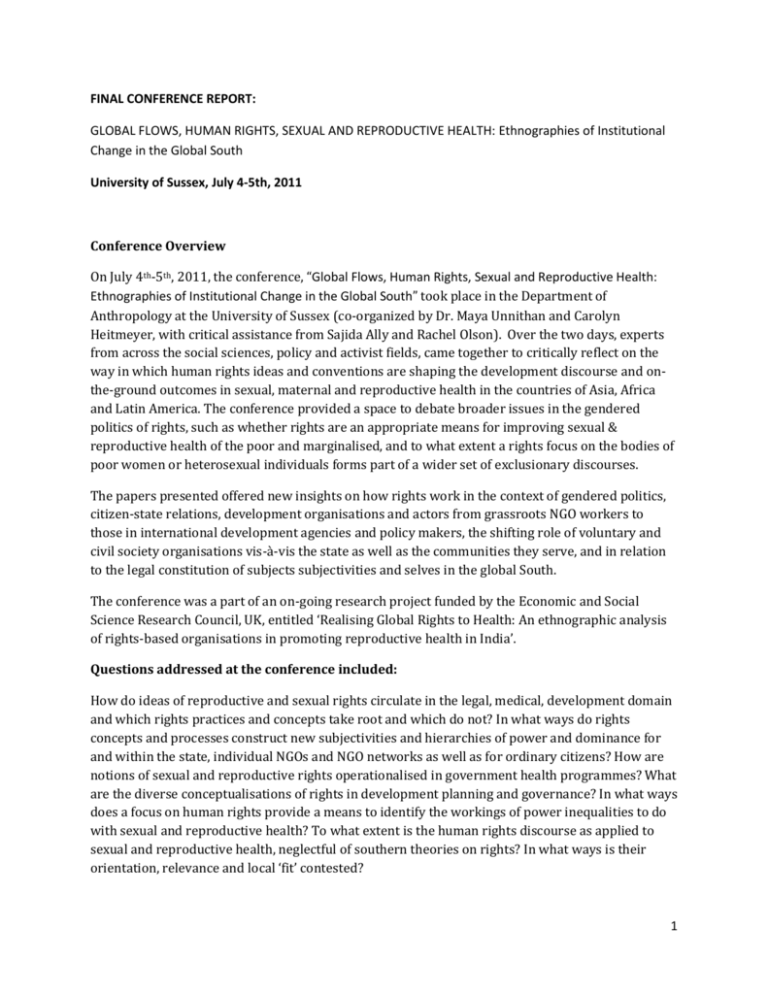
FINAL CONFERENCE REPORT: GLOBAL FLOWS, HUMAN RIGHTS, SEXUAL AND REPRODUCTIVE HEALTH: Ethnographies of Institutional Change in the Global South University of Sussex, July 4-5th, 2011 Conference Overview On July 4th-5th, 2011, the conference, “Global Flows, Human Rights, Sexual and Reproductive Health: Ethnographies of Institutional Change in the Global South” took place in the Department of Anthropology at the University of Sussex (co-organized by Dr. Maya Unnithan and Carolyn Heitmeyer, with critical assistance from Sajida Ally and Rachel Olson). Over the two days, experts from across the social sciences, policy and activist fields, came together to critically reflect on the way in which human rights ideas and conventions are shaping the development discourse and onthe-ground outcomes in sexual, maternal and reproductive health in the countries of Asia, Africa and Latin America. The conference provided a space to debate broader issues in the gendered politics of rights, such as whether rights are an appropriate means for improving sexual & reproductive health of the poor and marginalised, and to what extent a rights focus on the bodies of poor women or heterosexual individuals forms part of a wider set of exclusionary discourses. The papers presented offered new insights on how rights work in the context of gendered politics, citizen-state relations, development organisations and actors from grassroots NGO workers to those in international development agencies and policy makers, the shifting role of voluntary and civil society organisations vis-à-vis the state as well as the communities they serve, and in relation to the legal constitution of subjects subjectivities and selves in the global South. The conference was a part of an on-going research project funded by the Economic and Social Science Research Council, UK, entitled ‘Realising Global Rights to Health: An ethnographic analysis of rights-based organisations in promoting reproductive health in India’. Questions addressed at the conference included: How do ideas of reproductive and sexual rights circulate in the legal, medical, development domain and which rights practices and concepts take root and which do not? In what ways do rights concepts and processes construct new subjectivities and hierarchies of power and dominance for and within the state, individual NGOs and NGO networks as well as for ordinary citizens? How are notions of sexual and reproductive rights operationalised in government health programmes? What are the diverse conceptualisations of rights in development planning and governance? In what ways does a focus on human rights provide a means to identify the workings of power inequalities to do with sexual and reproductive health? To what extent is the human rights discourse as applied to sexual and reproductive health, neglectful of southern theories on rights? In what ways is their orientation, relevance and local ‘fit’ contested? 1 Conference Welcome The conference began with a brief address by Dr. Maya Unnithan. She outlined the context from which the conference came, including describing the ESRC project, ‘Realising Global Rights to Health: An ethnographic analysis of rights-based organisations in promoting reproductive health in India’. The key focus of the project has been to learn how state and civil society institutions in India understand and use a human rights framework and how this is applied in the field of reproductive and sexual health. A key aim for the conference was to examine the findings from India in the context of other work going on in Africa, Asia, Latin America and the Middle East. Maya outlined three areas for discussion at the conference. Firstly, evaluating the role of human rights as a development paradigm (especially in the light of recent critiques which emphasise the individualising and neoliberal aspects of rights based development approaches) was noted. Next, the importance of reflecting on the politics and cultures of the diverse institutions associated with human rights (such as UN bodies, states, civil society organisations, communities, religious bodies, medical establishments, legal organisations) in terms of the languages and practices of governance and for the realisation of rights comes to the forefront of some of these discussions. Finally, we must consider what a focus on sexuality, reproduction and health brings to the thinking and acting around human rights as well as enabling a move beyond it. Conference Sessions Session 1: The Realisation of Sexual and Reproductive Rights Discussant: Marie Dembour, Professor of Law and Anthropology, Sussex This session brought together experts from a variety of places and organisations, including Stephanie Schlitt from Amnesty International, Jameen Kaur, speaking about her legal work in India, as well as Nana Oye Lithur from the Human Rights Advocacy Centre in Ghana, West Africa. Stephanie’s paper focused on international developments on sexual and reproductive rights in the 20 years since the Cairo Programme of Action. She reflected on what has worked, and what has not worked at the international level on sexual and reproductive rights and identified how lack of recognition of women's rights has often led to a denial of sexual and reproductive rights. Based on evidence from the ground and the global developments she examined the opportunities and challenges that face the sexual and reproductive rights discourse. Jameen focused on one case study of a woman denied treatment in the case of foetal death in India. Through this, she examined the role that litigation has had in ensuring access to the right to maternal health, sexual and reproductive rights and explored a range of national, regional and international judgements/legal mechanisms from the 'South' and illustrated the consequences/ implications these can have on women and their enjoyment of their right to sexual and reproductive autonomy. 2 Nana’s presentation explored how rights advocates have used international reproductive rights standards, international treaties and policy documents including the ICPD and MDGs to successfully advocate for the introduction of comprehensive abortion care within the Ghana Health Service. Discussion: Marie noted that the idea that law is unified exists only in the minds of lawyers. She asked: how are states going to justify the laws that harm the health of women? The law in theory and the way in which it is practiced on the ground are disparate. Stephanie mentioned that the idea of ‘global flows’ is important because the experience of law is locally based and, as such, we need to bring up these experiences from the ground. Marie also asked whether there is a consensus that reproductive rights are indeed human rights and stated that we need to go beyond the issue of abortion. Stacy raised the question of numbers: how do we know these things (what we ‘know’). The point was also made that in countries of the Global South, activists manages to bring up things such as entitlements more than in Western courts. Other questions that came out of the discussion included: How much is race an issue in maternal deaths? (There is, as of now, no evidence for this). What do we do in a society that is resistant? Andrea Cornwall: how do transnational groups work together? Session 2:Institutions and Everyday Contexts of Rights Discussant: Karina Kielmann, London School of Hygiene and Tropical Medicine The three presentations in this session focused on the role of institutions within the everyday contexts of rights. Jashodhara Das Gupta (SAHAYOG) critically examined her own work and the work of the NGO she works in the development of ‘rights-based’ strategies’ around maternal health in Uttar Pradesh, India. Pinar Oktem (University of East Anglia) looked at how human rights ideas are used by various actors surrounding HIV/AIDS interventions in Turkey. Maya Unnithan and Carolyn Heitmeyer (University of Sussex) explored how human rights are interpreted by NGO workers working in the field of health in Rajasthan, India. Jashodhara’s presentation focused on re-examining NGO work on reproductive health and rights in India through the journey of SAHAYOG. SAHAYOG is a not-for-profit voluntary organization that was set up in India in 1992, and started with community-based interventions for women’s empowerment, including reproductive health and rights, in the mountainous region of Uttar Pradesh state. She documented the last ten years describing the experiences of SAHAYOG’s work to develop ‘rights based’ strategies around maternal health. She concludes that social justice aspect may be better emphasized through the framework of ‘rights among the wronged’ rather than the ubiquitous UN and donor language of ‘rights based approaches in development’. 3 Pinar’s paper explored how human rights ideas are approached and used by NGOs, state and international organisations in their works on sexual and reproductive health in Turkey, through the discussion on the discourses and interventions on HIV/AIDS. Maya Unnithan and Carolyn Heitmeyer posed the question: Do global human rights change development practice? In their paper, they examine the integration of rights language into national and state policies in India is taking place alongside an increasing collaboration between the state and NGO-led community organisations. They argue that the new forms of rights-related partnerships with the state are not straightforward, as they bring southern NGOs under greater scrutiny by the state, limiting their power to effect change. But these partnerships also function to open up critical spaces for empowerment which would otherwise not exist, such as enabling substantive civil society input into the drafting and implementation of state development projects. Discussion: Karina brought up the way in which Pinar’s paper looked at the disconnect at the broadest level of state discourse and the hierarchy of rights. She asked: how fertile is the ground to have a common currency to talk about rights? What type of rights acquire legitimacy at a particular moment? How do people talk about making claims on the state? Maya and Carolyn’s paper suggested the realities of an imposed discourse on people’s lives and the role of duties as a counterpart to rights. In South Asia, there is greater talk about responsibilities in relation to rights. Their paper examined how organisations that have fought for health services, are now being shifted to struggle rather than providing delivery of health services. Jashodhara’s paper showed how SAHAYOG mobilised people to get their voices heard and the steps which the organisation takes to address rights. It was quite self-reflective in that she is situated within that organisation. Some of the questions posed during the discussion included: What has been the historical shift in public health focusing on ‘needs’ to a greater emphasis on rights? Where are we in the trajectory of rights-based discourses? How does this relate with changing definitions of health and health services to and increasing focus on intangible things (i.e., healthy childhood, ‘safe motherhood’, etc.)? The tension between individual rights and the rights to defined public goods. As sexual health is increasingly seen as a public good, there will be a greater shift in the public discourse. Pluralisation of rights holders and duty bearers: How does a rights-based discourse presume accountability? 4 Session 3: Discussant: Andrea Cornwall, Dept. of Anthropology, University of Sussex Two papers were presented in this session, one by Stacy Pigg (Simon Fraser University, Vancouver, Canada) and the second by Hayley MacGregor, Institute of Development Studies, Sussex (paper cowritten with Elizabeth Mills, Institute of Development Studies, Sussex). Stacy’s paper draws upon ethnography to explore the on-the -ground enactment of post-Cairo policy commitments for the promotion of contraceptive access in Nepal. Both policy-makers and front-line health workers narrate a decisive shift from the ‘old’ model of ‘motivation’ to a ‘new’ model of ‘client rights.’ But interviews, clinic observations, and policy documents reveal a far more ambiguous entanglement of practices, goals, and values. . Actors hold varied ideas about “awareness”/education, method suitability, and power structures in families, and these intersect with the internationally established policy pillars of ‘client choice,’ ‘counselling,’ and ‘quality of care.’ These points of intersection are the object of active reflection, producing a hyper-awareness of ‘how things are in Nepal,’ an awareness that faces up to immediate material and social limits while also imagining alternative possible futures. Hayley and Elizabeth’s paper focused on women’s accounts of AIDS activism framed rights and responsibilities in sexual and reproductive health. In South Africa, policy with respect to HIV/AIDS has had a strong rights-based framing in line with international trends and in keeping with the constitutional overhaul in the post-Apartheid era. The paper explored the experience of HIV as a chronic illness (and the corresponding need to adhere to ART), and how this is linked to the way in which the language of ‘responsibility’ has come to counter-balance a language of rights in the treatment literacy campaigns of activist organisations and in government HIV treatment programmes. In addition, the paper reflected on the implications of this in a context of gender and socio-economic broader inequality. Session 4: Sexuality, Activism, Rights Discussant: Stacy Pigg, Professor of Anthropology, Simon Fraser University, Canada In this session, the three presenters (Paul Boyce, Institute of Education; Akshay Khanna, Institute of Development Studies, Sussex; Carolyn Williams, LSE) explored the topic of sexuality, activism and rights in regions of Africa, India, and Peru, respectively. Paul reported on research that explores the social contexts, life experiences, vulnerabilities and sexual risks experienced by men who sell sex in southern and eastern Africa, with a focus on five countries: Kenya, Namibia, South Africa, Uganda and Zimbabwe (with a particular focus on research activities in Kenya and Namibia). As well as seeking to better understand differing and similar socio-cultural scenarios and personal life stories of male sex workers in these countries, a key and specific aim was to improve terms for the representation of male sex workers in relevant regional organizations, in particular within the African Sex Workers Alliance (ASWA) – members of which 5 participated in and supported this research process. The findings reaffirm the need for specific male sex worker representation within ASWA as well as the need for specific social support, health education and HIV prevention programmes for male sex workers in the region more widely. Akshay presented a paper based on ethnographic fieldwork related to the litigation surrounding the anti-sodomy section of the Indian Penal Code (Section 377) in India. He argued that the juridical register requires demands for rights to articulate in terms of subjectivity and personhood, and examines the ways in which this disjuncture came to be managed by the movement. The paper examined various theoretical approaches to subjectivity and argues for a conceptual distinction between the idea of the 'subject' and the 'self'. Subjectivity, it is argued, is better understood in terms of forms of (legal) legibility, bringing our focus onto the political-economic, historical and cultural conditions under which these forms come to be performed as embodiments-in-the-world. Carolyn examined the work of feminist and LGBT organisations in Peru that play a leading role in the national and Latin American feminist movements' work on women’s sexuality, located within the framework of sexual and reproductive rights, women's human rights, lesbian rights and nondiscrimination on the basis of sexual orientation. The paper addresses one central question: Why are representations of same-sex sexuality among women from the low-income and mestizo (mixed race) 'popular sectors' absent from Peruvian feminist and LGBT discourse on sexual and LGBT rights? To do this, Carolyn traced the changing explicit and implied meanings of 'sexuality' in this discourse, and focused on three major fields of action: regional and national sexual and LGBT rights policy advocacy and rights-based training with women community leaders from Lima’s shanty towns. Discussion: All three papers explored the way in which rights are deeply historicised and deal with colonised and post-colonial contexts. Stacy suggested that we need to focus on historically-determined social locations and address the issue of the role of theory in the worldview of activist themselves. Stefan Elbe (University of Sussex) asked whether the language of rights changes the stage of discussion. Session 5: Ethics, Contestation and Rights Discourse Discussant: Christopher Davis, Department of Anthropology, SOAS Three papers were presented in this session. The first by Catherine Campbell (LSE), the second by Lynn Morgan (Mount Holyoke College) which was read by Carolyn Heitmeyer, and the final paper was presented by Margaret Sleeboom- Faulkner (University of Sussex). Catherine Campbell presented on the themes of rights, agency and the globalisation in the HIV/AIDS response in southern Africa. Drawing on case studies of AIDS interventions in southern Africa, her paper explored these debates through a discussion of the ways in which the flows of resources, expertise and influence characterising the globalisation of the AIDS response have impacted on opportunities for the exercise of health-related agency by members of target communities. 6 Lynn’s paper addresses the appropriation of ‘human rights’ discourses by religious conservatives (especially in Argentina) who opt to utilize discourses of human rights to fight for parental rights, foetal rights, and natural (i.e., divine) rights, and to argue for a ‘uniquely Latin American tradition of human rights’ that supports their interpretation. Margaret Sleeboom-Faulkner’s paper identified three major areas in need of work to put into perspective the concept of biopower and reproduction in Asia. Firstly, tools need to be developed to enable comparison between forms of governance. Secondly, any study of the historical development of governance within countries needs to address its connection between the adoption of tools of governance as a result of international pressures. Thirdly, a characterisation of governance institutions can only be meaningful if understood in interaction with its practice. Examples of work on abortion, fertility, hygiene and disability in Asia were drawn upon to illustrate this. Discussion: In her discussion of the three papers, Kit Davis alluded to the fact that there were a number of counterfactual examples in this session’s papers. Inn reference to Lynn Morgan’s paper which alluded to the African American figure Rosa Parks, Kit commented on the fact that you can’t be a black American and not be aware of the power of the law. In this sense, human rights need to be seen in regards to sovereign power. Furthermore, there is a need to look at people’s lives and how the inherent ‘messiness’ is, in itself, productive. Conference Key Notes Inaugural address: Sexual and Reproductive Health Rights: Sites (and suits) of Struggle Professor Paul Hunt, Department of Law/Human Rights Centre, Essex University, UN Special Rapporteur on the Right to the Highest Attainable Standard of Health (2002-2008) Chair: Professor Michael Farthing, Vice-Chancellor, University of Sussex Paul Hunt used the image of rights as sites of struggle in his inaugural address. He alluded to the signals of uneven sites of power which lead to disadvantage and inequality. In this sense, power relations have shaped international human rights law. If necessary, the middle class uses its money and social capital to exercise rights. However, the powerless and disadvantaged desperately want rights, but the middle classes are those who ultimately have power. Social rights will only be implemented if the disadvantaged have some share of power through the implementation of social rights. This struggle is not only targeted against the public-private dichotomy, but also the wider class system which is why the process of ensuring the right to health is sapping and slow. Not only is there confrontation with the glass barrier of gender, but also that of class. Given this, is it even possible to say that social rights are really human rights at all? This question is never asked any 7 longer within the United Nations. While courts around the world routinely adjudicate social rights, we need to devise additional new remedies specifically designed to address these challenges. Special lecture: ‘Biopolitics at the Crossroads of Sexuality and Disaster: Two Recent Cases’ Rosalind Petchesky, Distinguished Professor of Political Science, Hunter College, New York Chair: Professor Peter Aggleton, School of Education, University of Sussex In her special lecture, Professor Rosalind Petchesky argued that combining a feminist view of intersectionality with a Foucauldian analysis of biopolitics provides a useful vantage point for understanding the sexual dimensions of disaster and the geopolitical dimensions of sexual controversy. In doing so, she drew upon two recent cases: the anti-homosexuality bill and murder of David Kato in Uganda and the hurricane, cholera epidemic and sexual violence in Haiti. Ros focused on the ways in which these crises function as magnets for various forms of neo-colonialism and capitalist investment, the problems associated with the militarization of humanitarian (including health) assistance, and the challenges these new scenarios present to feminist, LGBTQ and human rights activists. Concluding remarks for the conference: Maya concluded the workshop by thanking the speakers and participants who took part in the workshop. On behalf of herself and Carolyn, she also gave special thanks to the funding which made the conference possible (and the larger research project on which the conference is based) from the Economic and Social Research Council (ESRC). In addition, she thanked the Wellcome Trust, the University of Sussex Global Transformations and Environment and Health Research Themes and the University of Sussex Doctoral School who also contributed generous funding for the conference. 8 Conference speakers and participants: Sajida Ally, University of Sussex s.ally@sussex.ac.uk Peter Aggleton, University of Sussex p.aggleton@sussex.ac.uk Stephen Bell, University of Sussex steveabell78@gmail.com Paul Boyce, University of Sussex p.boyce@ioe.ac.uk Agatha Bula, City University London agatha.bula.1@city.ac.uk Cathy Campbell, London School of Economics c.campbell@lse.ac.uk Elizabeth Challinor, CREA e.p.challinor@gmail.com Anastasia Christou, University of Sussex a.christou@sussex.ac.uk Andrea Cornwall, University of Sussex a.cornwall@sussex.ac.uk Jashodhara Dasgupta jashodhara@sahayogindia.org Christopher Davis, SOAS cd3@soas.ac.uk Bregje de Kok, Queen Margaret University bregje.dekok@gmail.com Marie Dembour , University of Sussex m.dembour@sussex.ac.uk Brendan Donegan, SOAS brendandonegan@hotmail.com Stephan Elbe, University of Sussex s.elbe@sussex.ac.uk Carolyn Heitmeyer, University of Sussex c.heitmeyer@sussex.ac.uk Ghada Ibrahim, City University London ghada.ibrahim.1@city.ac.uk Jameen Kaur, Independent researcher jameeny@hotmail.com Zdenek Kavan, University of Sussex z.kavan@sussex.ac.uk Akshay Khanna, Institute for Development Studies, Sussex a.khanna@ids.ac.uk Karina Kielmann, London School of Hygiene and Tropical Disease karina.kielmann@lshtm.ac.uk Eva Luksaite, Brunel University eva.luksaite@brunel.ac.uk Hayley Macgregor, Institute for Development Studies, Sussex h.macgregor@ids.ac.uk Christine McCourt, City University London christine.mccourt.1@city.ac.uk Lynn Morgan, Mount Holyoake College, US lmmorgan@mtholyoke.edu Rachel Olson, University of Sussex r.olson@sussex.ac.uk Pinar Oktem, East Anglia University p.oktem@uea.ac.uk Nana Oye Lithur, Human Rights Advocacy Center, Accra nanaoyel@yahoo.co.uk Rosalind Petchesky, Hunter College, New York rpetches@igc.org Stacy Pigg, Simon Fraser University, Vancouver pigg@sfu.ca Francesca Salvi, University of Sussex francescasalvi@aim.com Stephanie Schlitt, Amnesty International sschlitt@amnesty.org Margaret Sleeboom-Faulkner, University of Sussex m.Sleeboom-Faulkner@sussex.ac.uk Alice Street, University of Sussex a.street@sussex.ac.uk Maya Unnithan, University of Sussex m.unnithan@sussex.ac.uk Carolyn Williams. London School of Economics carolinahwilliams@gmail.com 9

![Expectations of an Associate Tutor [DOCX 48.11KB]](http://s3.studylib.net/store/data/006817972_1-1b02bdb328757c6633bf3d39d22408ee-300x300.png)
